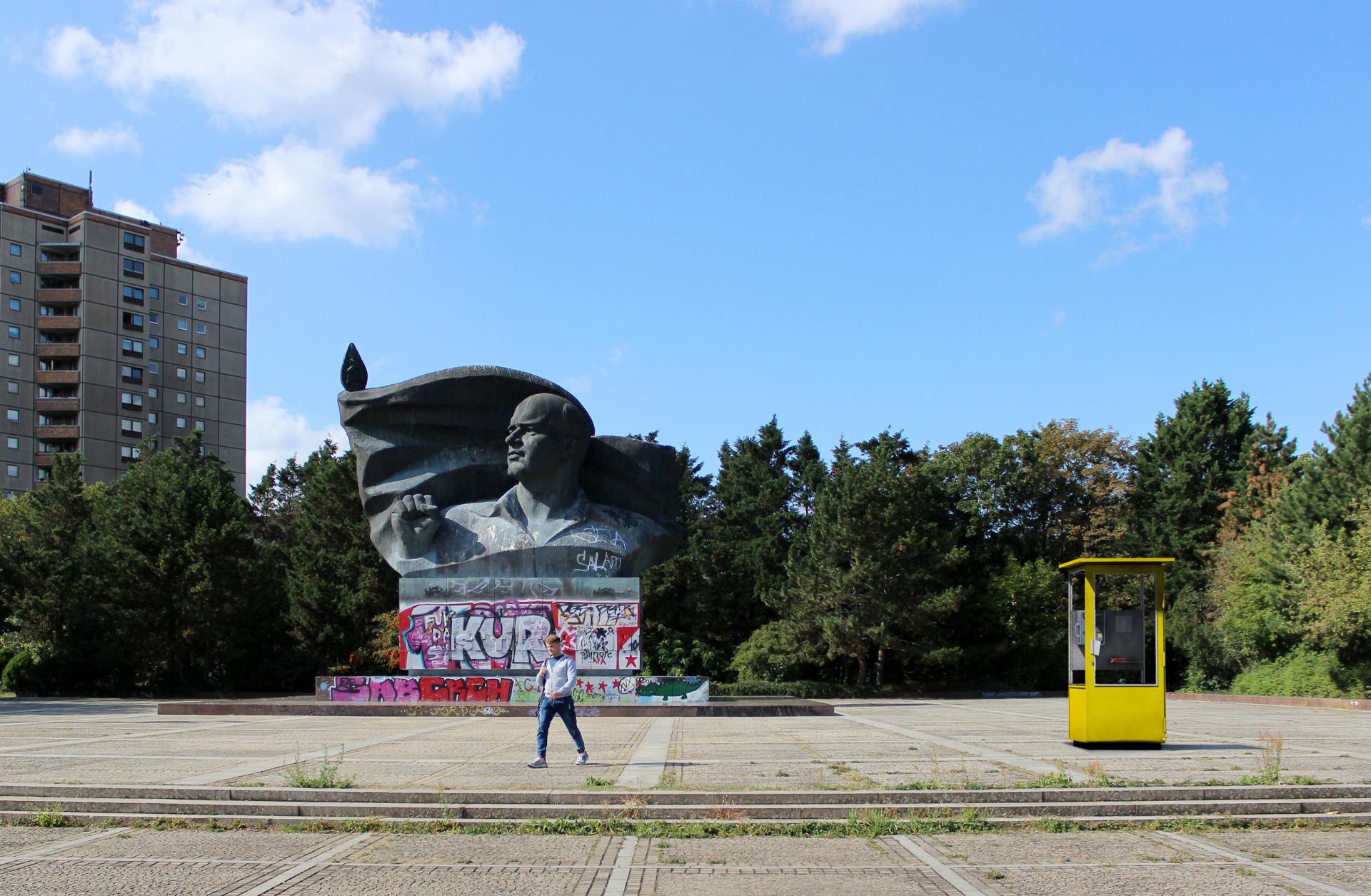superposition
Competition "Artistic comment on the Ernst Thälmann Monument" Berlin, 2019 (proposal)
Steel, plastic, sound, text, light
In co-operation with Berthold Seliger
People approaching the monument square from Greifswalder Strasse see a telephone booth to the right, with proportions that are strangely enlarged.
The door can be opened and on entering, the receiver quietly, but audibly plays the song „Anmut sparet nicht noch Mühe" by Brecht/Eisler, sung by Hanns Eisler himself. *
Two books have been placed in the telephone booth:
One contains information on the song and the story of its composition.
The other contains documents on the victims of right-wing violence in Germany since 1990, which is regularly updated.
As darkness descends, the booth is illuminated from inside.
The design counteracts the staging and massive scale of the monument with a mise-en-scène of a completely different kind, with much smaller dimensions.
The simple, transparent alien structure is visible from afar on the spacious square. It acts as a counterpart to the monument itself, which also appears to stem from another time. As one comes closer, the size of the telephone booth irritates the visitors, making them feel "shrunk". On entering, they are also welcomed by a song that seems to be playing to them alone.
„Anmut sparet nicht noch Mühe" was composed in 1950 and describes a utopia in apparently easy tones. During those first years of the GDR, Brecht and Eisler resumed their close collaboration, which had begun in 1930 and continued in exile from 1933 onwards. The aim of their joint productions was nothing less than to change the world – because "it needs it".
The song does not assume the self-assured, combative tone of the workers and agitprop songs of the 1920s and 1930s, although we also hear the careful pathos of the GDR national anthem, which was written in 1949 by Johannes R. Becher(„steigt ein frei Geschlecht empor"/ trans.: "a free generation rises up") and was also set to music by Hanns Eisler. Nor does it contain the nationalist pathos of the former German national anthem by Hoffmann von Fallersleben, known as the „Lied der Deutschen".
The recording chosen for this installation was produced by chance and was not intended for public release. Eisler had no "singing voice", but it shows how he wished his songs to be interpreted: With "intelligence", neither beautifully sung nor virtuously played, but consciously articulating the meaning of the song down to the last detail. Eisler was firmly convinced that any person "who is not a fool" could sing his songs, provided he made an effort "to avoid sentimentality, bombast, pathos, stupidity of all kinds, to bring the lyrics well and yet sing them."
And his singing also reveals another aspect: in 1955, Eisler had to defend himself against attacks by dogmatic cultural functionaries, who banned the premiere of his opera „Johann Faustus". Revelations on the crimes of Stalinism were also a heavy burden on Eisler (today, we know that Stalin refused an exchange of prisoners including Thälmann, condemning Thälmann to more than eleven years in prison and internment at Buchenwald concentration camp, where he was murdered on direct orders by Hitler).
During the "Faustus discourse", Eisler noted in 1953: "It is a crying shame to observe the birth pangs of a new society. How much courage, talent, discipline, heroism, how much heaviest toil, how much intelligence and how much stupidity! Great successes that are undermined by unspeakable mistakes!"
As Eisler sings „Anmut sparet nicht noch Mühe", one can clearly sense his knowledge of the crimes of Stalinism, the social contradictions of the GDR, the illusion of brazen certainty, indeed even doubt, as he performs the nevertheless hopeful childrens hymn.
* https://www.youtube.com/watch?v=a7GkiBcPz1s
In Rehearsal with Hanns Eisler: Anmut sparet nicht noch Mühe

